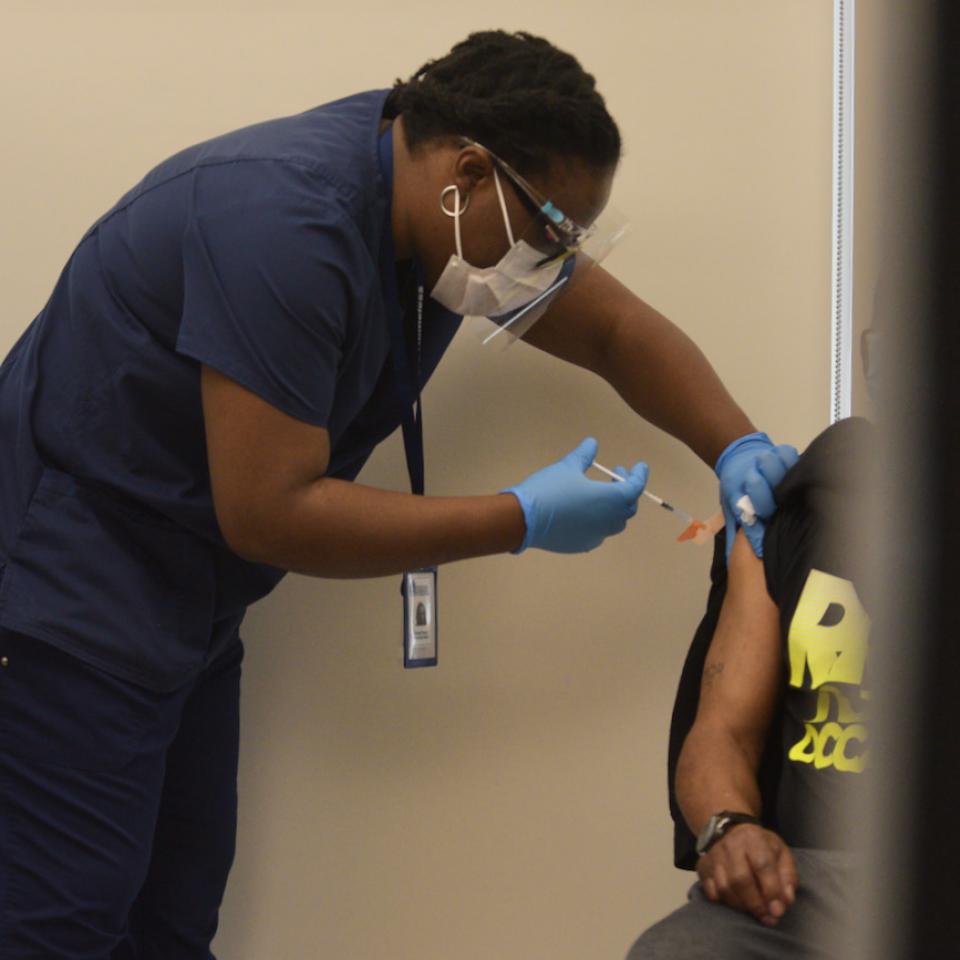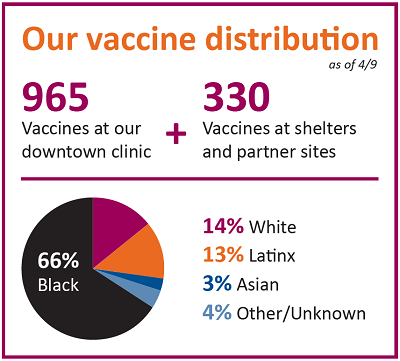Founded in 1979, the Maryland Food Bank provides six million meals a year in Maryland through its partnership with nearly 1,200 soup kitchens, pantries, shelters, and community-based organizations. Learn more about their work.


04.26.21
Michael Moore didn't need to be convinced.
A year into a global pandemic, he was tired of talking to his sister on the phone, of seeing his 96-year-old mother, Mildred, through a window. So when his provider, Senior Medical Director Laura Garcia, CRNP, asked if he wanted the COVID-19 vaccine, his answer was simple: “Tell me where and when.”
Michael was at severe risk for the worst outcomes of COVID-19. “You name it, I’ve had it,” Michael says. “I’ve had heart issues, cancer twice, two strokes and kidney problems. I’ve had to be really careful.”
Michael was one of the first of 1,300 people to get a COVID-19 vaccine from Health Care for the Homeless. At the current pace of 40-60 doses a day, we’re on track to vaccinate over 2,000 people by this summer and at least 5,500 by the end of the year.

Michael knows he might not have gotten the vaccine without that direct call from his primary care provider. Maryland’s vaccine rollout is mostly online, which makes it
hard for people in distressed communities to get information or appointments. Despite the fact that Black people died from COVID-19 at rates twice those of whites, Black Marylanders like Michael remain much less likely to have been vaccinated than white residents (23.5% vs. 35.7% as of April 8).
In addition to daily vaccinations on-site at our downtown clinic, our providers are also delivering them to people in temporary housing, shelters and hotels-turned-shelters.
“If residents had to navigate the scheduling system and then find ways to get to vaccination sites, I am certain many would not have been able to get the vaccine,” says Katie Allston, Executive Director of Marian House, where 30 women received the vaccine from our providers in March.
Now that he is fully vaccinated, Michael looks back on a year of COVID-19. Time alone, combined with regular telehealth and in-person check-ins with Laura, has helped him make significant strides. “My health is better,” he says. “I’ve slowed down and focused on myself. I’ve worked to stop drinking, stop smoking and now I’m eating healthier, too.”
And mostly he is excited, because for so long he has waited for the day when he could finally put down the phone and go spend time with his mother and sister. Now, that day seems much closer.
If you haven't yet, now's the time to get your vaccine.
More Recent News
More than a quarter of all client visits to Health Care for the Homeless are with case managers. Presented below is one day in the life of Case Management Coordinator Adrienne Burgess-Bromley, who has been with the agency for 16 years.
Baltimore, you are rockstars! On the sunny first Saturday of November, 300+ runners, walkers, friends and volunteers took over Patterson Park for the 10th Annual Rock Your Socks 5K! We danced, cheered and enjoyed a festive race village complete with coffee, bagels, donuts, a bounce house and easy ways to engage with community partners.
Since opening Sojourner Place at Oliver in 2022, our affordable housing development team has been busy laying the groundwork for more affordable housing in Baltimore through a newly formed subsidiary under Health Care for the Homeless called the HCH Real Estate Company.



